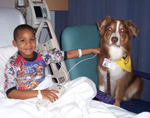Pet Therapy employees to make daily visits
by Dick PetersonPublic Relations
Lisa McKellar wouldn’t mind if the Children’s Hospital decided to put a few select dogs on the payroll. Okay, she didn’t actually say that, but she came close.
 Rafter
drops by for a Monday morning visit with Christian Smith in the Children's
Hospital.
Rafter
drops by for a Monday morning visit with Christian Smith in the Children's
Hospital.
“I wish they were here every day,” she said. As manager of Pediatric Cardiology Diagnostic Services, McKellar has seen first-hand how a living, breathing ball of fur with a cold nose and a warm heart can calm a frightened child faster than any child-health expert. And when it means a pacemaker can be checked, an ECHO procedure performed or an EKG taken, that canine becomes an indispensable therapist.
The program is called Pet Therapy, and it’s an expanded and certified version of the canine visitors MUSC enjoyed in past years to the delight of patients, visitors and staff. Added to the previous once-a-week visit, therapy dogs now make daily rounds to the Children’s Hospital atrium and to children’s bedsides. Although their busy schedule keeps them from being permanently employed by Pediatric Cardiology Diagnostic Services, the department makes good use of them whenever they are available.
“I remember one little 4-year-old girl,” McKellar cited as an example. “She was scared of the nurses, and she had her arms around her mother’s neck and wouldn’t let go. As soon as she spotted the therapy dog, she loosened her grip, stopped her crying.” McKellar said that in a matter of seconds, the nurses were on the floor with the child and dog busily taking the vitals that were unavailable only moments before.
“And this is not unusual,” McKellar said. “In fact, every time the dogs visit, the staff react to them as much as the kids do. They brighten everyone’s day.”
The newcomers are trainer Jane Hirsch and her therapy dogs, called K-9 Care Unit for Kids. In addition to being certified by a national therapy organization, Therapy Dogs Incorporated, Hirsch trains dogs and owners to become therapy dog teams and teaches them the behaviors that are helpful during therapy visits.
Children’s Hospital administrator John Sanders saw the benefit of therapy dogs when he worked at DuPont Hospital for Children in Wilmington, Del. “We saw children in the rehabilitation and oncology units respond in a way that allowed them to reach their potential quicker,” he said. “They ate better, they responded to therapy easier and they were able to leave the hospital sooner. It is not just entertainment, it’s a true enhancement to the care provided.” That experience, Sanders said, was why he asked about a therapy dog program almost as soon as he arrived at MUSC.
Sanders expects that with the program’s limited expansion will come an effort to include evenings, weekends and therapy dog visits in adult units.
If there’s a star in Jane Hirsch’s pack of therapy dogs, it has to be Rafter. Child Life Coordinator Sandra Oberman describes Rafter as one of the smartest, most delightful animals she has known. “And with Jane,” —Oberman smiles at the thought— “he’s so well trained.” She described Rafter’s hide-and-seek antics as he peeks from between Jane’s legs or how he sits and crosses his legs when told to sit like a gentleman.
By the way, Rafter has a special bond with some of the Children’s Hospital patients. Rafter is a cancer survivor.
“And the Halloween parade—Rafter and his friends, Peaches and Princess, dressed in costumes, led the parade. They were hysterical, and the children were enthralled,” Oberman said. “The kids get a real kick out of seeing the dogs. It becomes a connection to home.”
Oberman said that Hirsch can sense if a child is scared of dogs and
doesn’t force the animal on them. But she also knows the therapeutic effects
of touch and “stroking the dogs is terrific for their emotional state.
It’s an emotional support—a diversion.”
Friday, Jan. 28, 2005
Catalyst Online is published weekly, updated
as needed and improved from time to time by the MUSC Office of Public Relations
for the faculty, employees and students of the Medical University of South
Carolina. Catalyst Online editor, Kim Draughn, can be reached at 792-4107
or by email, catalyst@musc.edu. Editorial copy can be submitted to Catalyst
Online and to The Catalyst in print by fax, 792-6723, or by email to petersnd@musc.edu
or catalyst@musc.edu. To place an ad in The Catalyst hardcopy, call Community
Press at 849-1778.